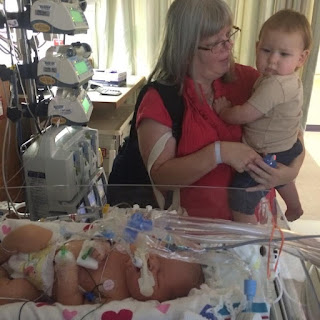Confronting Fear: A Parent's Guide to Coping with a Medically Fragile Child

John and Nana visiting Dot in the NICU for the first time. As a parent of a medically fragile child, facing your fears is an inevitable and often overwhelming part of the journey. I know for me personally, not keeping Dot back from the things in life she wants to do, has been a major goal I've had for our family since she was diagnosed in the NICU. It can be scary to watch your child go through medical procedures, cope with chronic pain, and navigate the challenges of a serious illness. But despite these fears, it's important to remember that you are not alone. There are countless other parents out there who are going through similar experiences, and it can be incredibly supportive to connect with them and share your struggles and triumphs. One way to face your fears as a parent of a medically fragile child is to educate yourself about your child's condition. The more you understand about what your child is going through, the better equipped you will be to advocate for th
